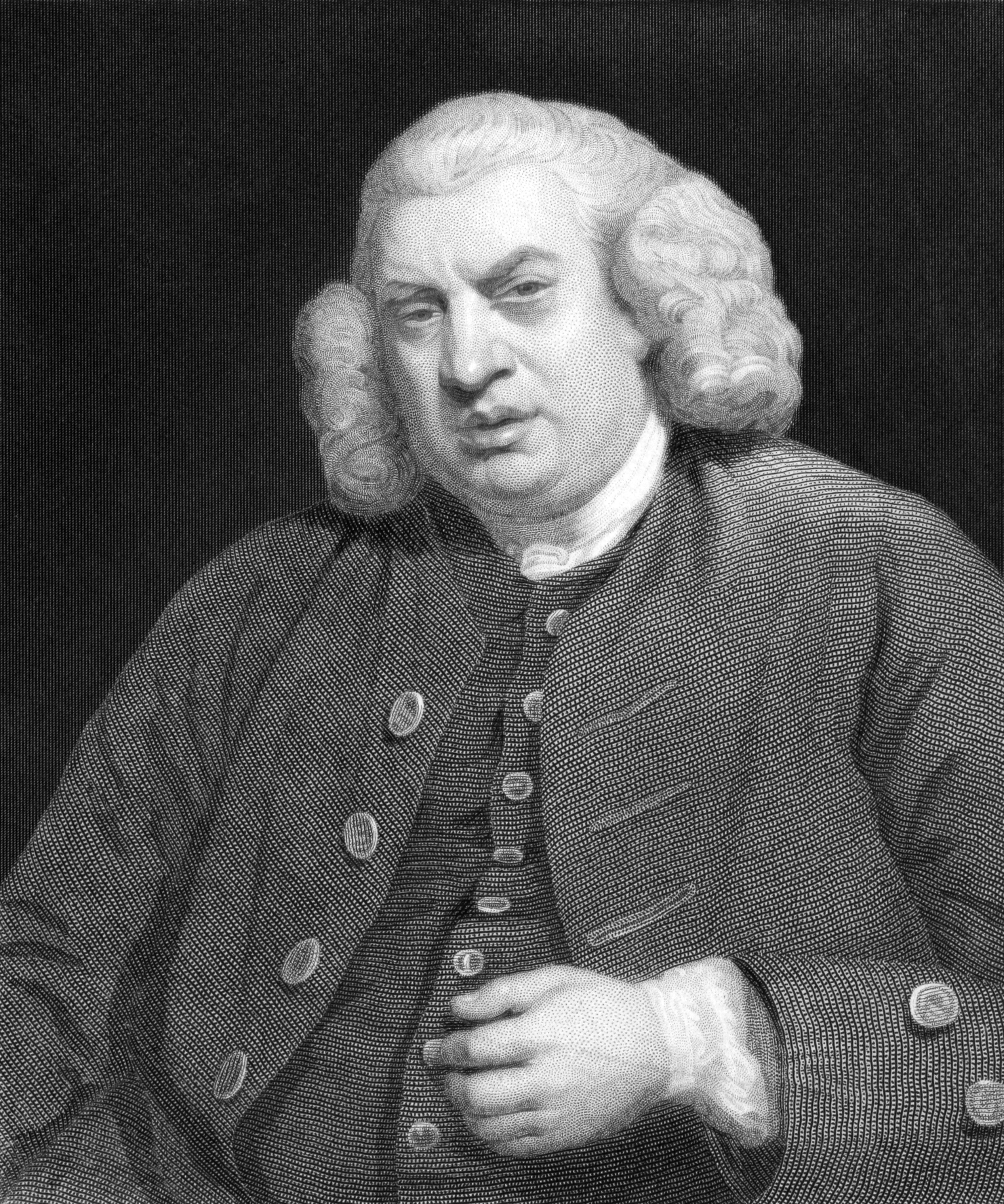Samuel Johnson frasi celebri
“Richardson aveva colto il nocciolo della vita… mentre Fielding si era accontentato del guscio.”
da Thraliana , a cura di Balderston, I, p. 555
riferendosi ai critici; citato in James Boswell, Vita di Samuel Johnson, 1754
citato in James Boswell, Vita di Samuel Johnson, 14 luglio 1763
“Ciò che è scritto senza sforzo è generalmente letto senza piacere.”
da Miscellanies
Johnson Miscellanies
Samuel Johnson Frasi e Citazioni
“Fielding è capace di descrivere un cavallo o un asino ma non ci è mai riuscito con un mulo.”
da Johnson Miscellanies, a cura di George Birkbeck Norman Hill, I, pp. 273-4
Origine: Citato in Ian Watt, Le origini del romanzo borghese (The Rise Of The Novel), traduzione di Luigi Del Grosso Destrieri, Bompiani, Milano, 1985.
“Le cifre tonde sono sempre false.”
citato in Apophthegms, Sentiments, Opinions and Occasional Reflections di Sir John Hawkins, in Johnsonian Miscellanies (1897), vol. II, pag. 2, edito da George Birkbeck Hill
Johnson Miscellanies
citato in James Boswell, Vita di Samuel Johnson, 30 aprile 1773
Origine: Citato in John Lukacs, Democrazia e populismo, traduzione di Giovanni Ferrara degli Uberti, Longanesi, 2006, p. 152.
citato in James Boswell, Vita di Samuel Johnson
Your manuscript is both good and original, but the part that is good is not original and the part that is original is not good.
[Citazione errata] Questa citazione viene spesso attribuita a Johnson ma non trova alcun riscontro nelle opere o nelle lettere dello scrittore, né tanto meno nelle biografie di Johnson scritte dai suoi contemporanei.
Attribuite
Origine: Samuel Johnson did not say: "Your manuscript is both good and original. But the part that is good is not original, and the part that is original is not good." http://www.samueljohnson.com/goodorig.html, Samuel Johnson.com.
“In quante poche case degli amici sceglierebbe di stare un uomo quando è ammalato!”
Origine: Citato in Boswell, Life of Johnson, IV.
Origine: Citato in Dizionario delle citazioni, a cura di Italo Sordi, BUR, 1992. ISBN 14603-X
“La natura ha dato alla donna un tale potere che la legge ha giustamente deciso di dargliene poco.”
Origine: Da Letters, I.
Origine: Citato in Dizionario delle citazioni, a cura di Italo Sordi, BUR, 1992. ISBN 14603-X
Samuel Johnson: Frasi in inglese
“Distance has the same effect on the mind as on the eye.”
Origine: The History of Rasselas, Prince of Abissinia
July 14, 1763, p. 121
Life of Samuel Johnson (1791), Vol I
Origine: The Life of Samuel Johnson, Vol 2
“This is one of the disadvantages of wine, it makes a man mistake words for thoughts.”
28 April 1778, p. 659 http://books.google.com/books?id=yYphdZ0abhUC&q="One+of+the+disadvantages+of+wine+it+makes+a+man+mistake+words+for+thoughts"&pg=PA659#v=onepage
Life of Samuel Johnson (1791), Vol II
Origine: The Life of Samuel Johnson LL.D. Vol 2
No. 58 (May 26, 1759)
The Idler (1758–1760)
Origine: The Idler; Poems
Contesto: Pleasure is very seldom found where it is sought. Our brightest blazes of gladness are commonly kindled by unexpected sparks. The flowers which scatter their odours from time to time in the paths of life, grow up without culture from seeds scattered by chance. Nothing is more hopeless than a scheme of merriment.
April 10, 1776, p. 305
Life of Samuel Johnson (1791), Vol III
Recalling "what an old tutor of a college said to one of his pupils" April 30, 1773, p. 217
Life of Samuel Johnson (1791), Vol II
Origine: The Life of Samuel Johnson LL.D. Vol 2
“Sir, I did not count your glasses of wine, why should you number up my cups of tea?”
Origine: The Life of Samuel Johnson, Vol 2
“New things are made familiar, and familiar things are made new.”
The Life of Pope
Lives of the English Poets (1779–81)
“If you are idle, be not solitary; if you are solitary, be not idle.”
Letter to James Boswell, October 27, 1779, p. 433
Life of Samuel Johnson (1791), Vol III
Origine: The Life of Samuel Johnson LL.D. Vol 3
Origine: The Life of Samuel Johnson LL.D. Vol 3
“A man may be so much of every thing, that he is nothing of any thing.”
1783, p. 500
Life of Samuel Johnson (1791), Vol IV
Origine: The Life of Johnson, Vol 4
“The only end of writing is to enable the readers better to enjoy life, or better to endure it.”
A Review http://andromeda.rutgers.edu/~jlynch/Texts/jenyns.html of Soame Jenyns' A Free Enquiry into the Nature and Origin of Evil, published in the first volume of Miscellaneous and Fugitive Pieces (London, 1774), p. 23
“Men more frequently require to be reminded than informed.”
No. 2 (24 March 1750) http://etext.lib.virginia.edu/etcbin/toccer-new2?id=Joh1Ram.sgm&images=images/modeng&data=/texts/english/modeng/parsed&tag=public&part=2&division=div1
Origine: The Rambler (1750–1752)
Origine: Taxation No Tyranny https://en.wikisource.org/wiki/Taxation_No_Tyranny (1775)
1783, p. 519
Life of Samuel Johnson (1791), Vol IV
